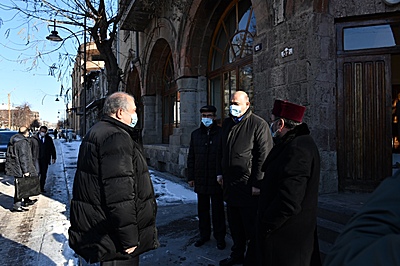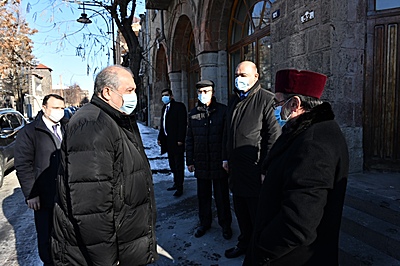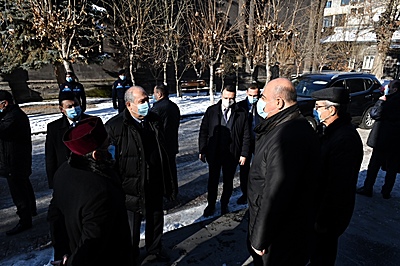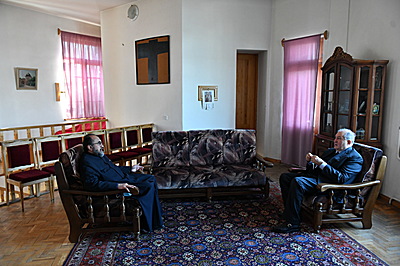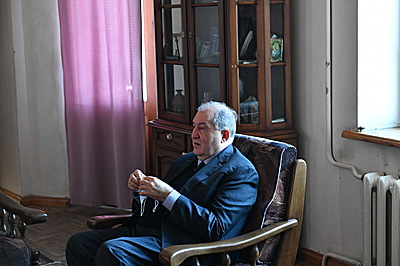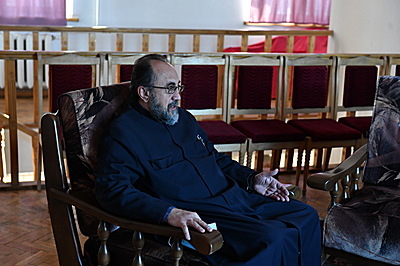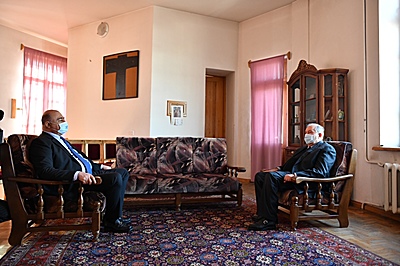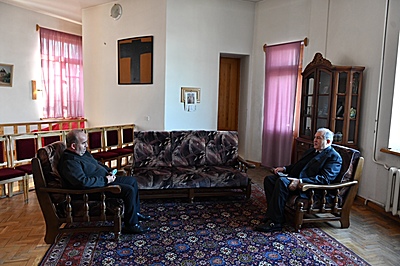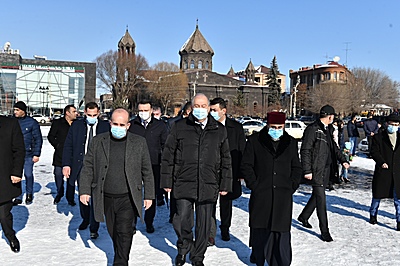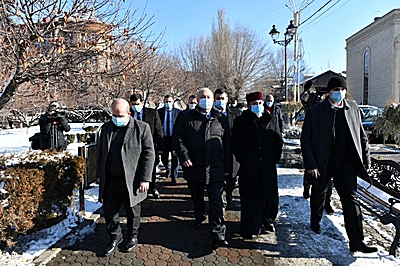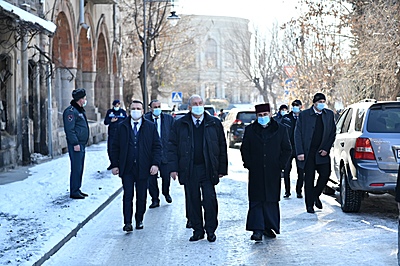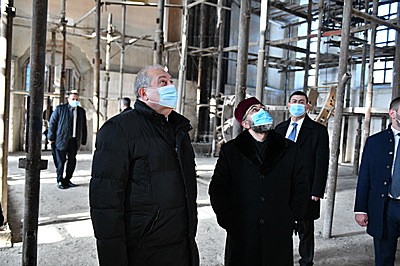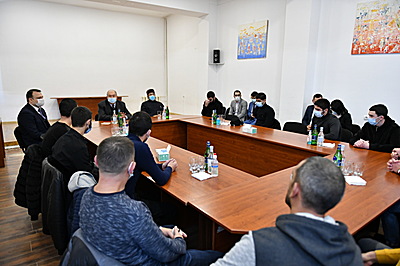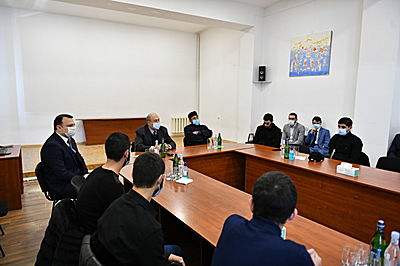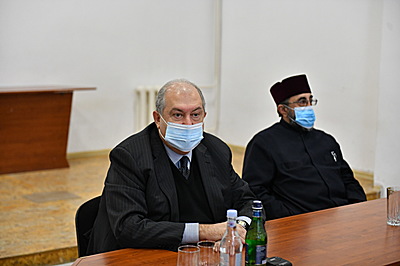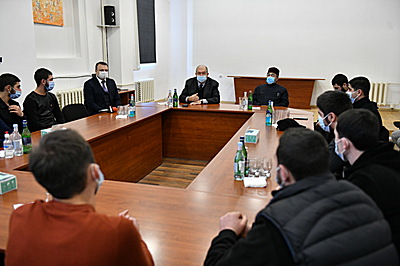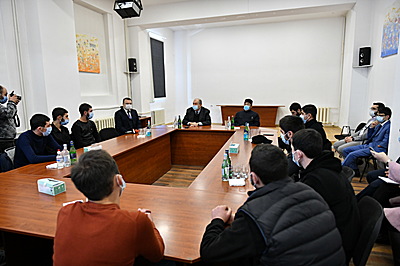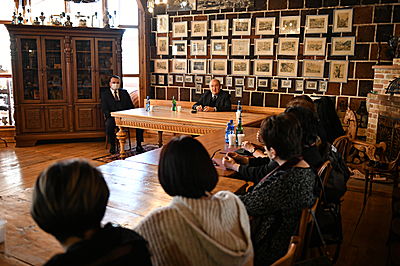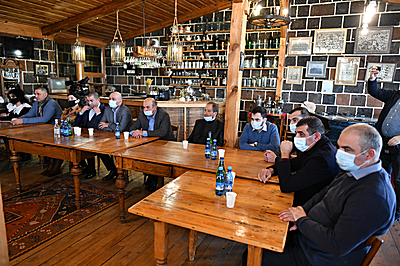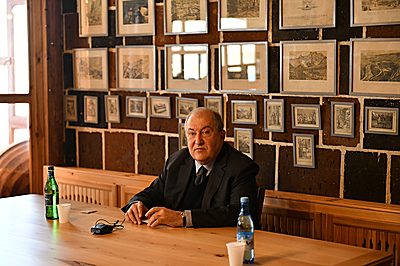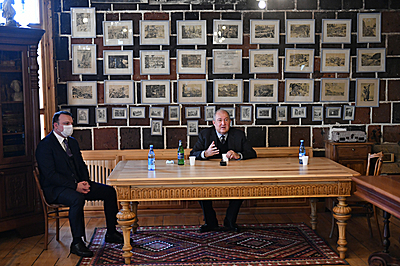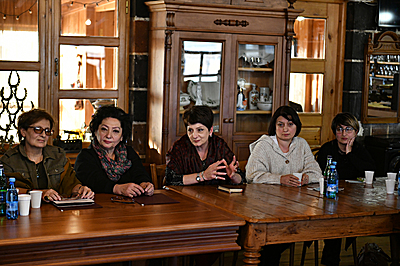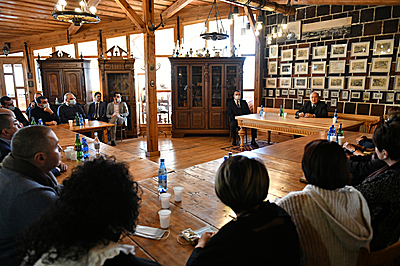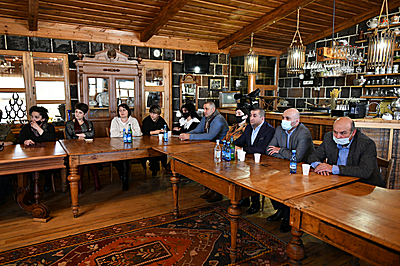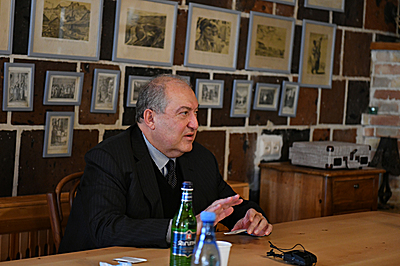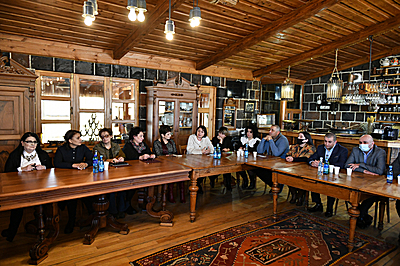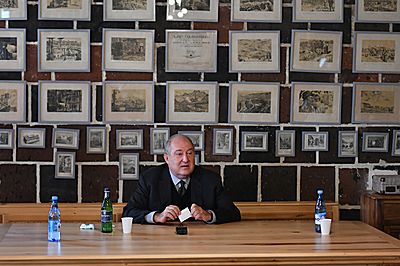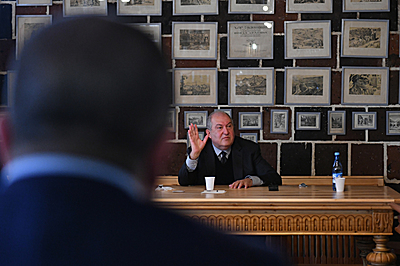Domestic visits
Working visit of the President Armen Sarkissian to Gyumri
President of the Republic Armen Sarkissian paid a working visit to Gyumri.
President Sarkissian met with His Grace Archbishop Mikael Ajapahyan, Primate of the Shirak Diocese of the Armenian Apostolic Church.
The President of the Republic and the Primate of the Shirak Diocese spoke about the heavy losses we suffered during the war and the crisis in the country. They agreed on having no alternative but to rise as a nation and a state by joint efforts.
Noting that the situation continues to be severe, they expressed concern and anxiety over the diverse challenges and problems facing the country and touched upon the ways to overcome them.
They considered it especially important to secure and protect the state borders and border communities, to resolve the problems related to the return of prisoners, hostages, and the search for the missing.
Accompanied by the Primate of the Shirak Diocese, the President of the Republic visited the Church of the Holy Saviour in Gyumri.
President Sarkissian also met with Shirak Governor (Marzpet) Tigran Petrosyan and Gyumri Mayor Samvel Balasanyan.
***
Within the framework of his visit to Gyumri, at the Social-Educational Centre of the Shirak Diocese, President Armen Sarkissian met with a group of conscripts and volunteers from Shirak who took part in the war.
His Grace Archbishop Mikayel Ajapahyan, the Primate of the Shirak Diocese of the Armenian Apostolic Church, was present at the meeting.
Expressing gratitude for the selfless service to defend their homeland, President Sarkissian said that our soldiers and our people did not lose the war. “I know you have passed a hard way; there are people who pass ten years in ten days. Each of you has gone through a great tragedy, hardships, and misfortunes,” said the President, “Yes, we lost this war, but let none of you ever feel defeated. There are never final victories or final defeats in this life. We won 26 years ago; we woke up every day thinking we were a victorious people; we went to bed with the psychology of a victorious person. Then, it turned out that we lost somewhere and heavily. But we lost not through your fault; you did not lose, you won.”
We won in 1994 because our volunteers soon became an army. Our spirit was the same, but we were a few years ahead of the enemy in our organization and training. People like Monte who had some experience came from other countries. Soviet army generals, colonels, and majors came and formed an army of powerful forces of volunteers.
Over the past years, we should have prepared for the war. For some reason, we believed that there would be no more war, though the enemy was preparing for that war on the other side of our border, and they did not conceal that.
My advice to you is the following: your life is ahead, maybe there will be another war where you will win. I say again, there is no final defeat, and you are not defeated people, your spirit is the same, there are hundreds and thousands like you; the people did not lose.”
The President noted that it is the duty of the state and all of us to take care of the families of the fallen heroes, as well as the injured and disabled servicemen and volunteers. Armen Sarkissian stressed that the President's Office is ready to assist in solving their problems. “Your life is still ahead; there is no final defeat. It is hard, but you have to fight. You each have a family. Your families are, in a sense, lucky that you returned home,” he said, at the same time as he paid tribute to the heroes killed in the war, “Take care of your families, from grandparents to children. That is very important. Secondly, find yourselves in life; each of you has a profession or is still studying. We have guys from the previous April war who work in the President's Office. You have not lost: your life and victories are ahead.”
The President of the Republic said that we would face the aftermath of the war for many years, and we still have to understand and deeply analyze the lessons learned from the defeat, soberly and accurately assess the situation and our opportunities, accept the existing realities and think of effective ways-out of the current crisis.
Referring to the situation in the country, the President noted that now it is not time to divide into blacks and whites, “if we have to choose a colour, that colour must be the tricolour.”
“We can get out of this situation if we are all together: I am with you, you are with me. It is difficult, but it is not the first time we have seen difficulties,” he said, referring to the 1988 earthquake. “Thus, be strong, I wish you all good health.”
***
President of the Republic Armen Sarkissian met with the public representatives in Gyumri.
During the two-hour conversation, President Sarkissian and more than two dozen participants of the meeting: representatives of science, education, culture, legal, business, and public spheres, exchanged ideas on the situation in the country, presented their concerns and views, and discussed ways to resolve the current crisis.
“There comes a moment when you should try to put your feelings aside, and thinking coldly, plan what you will do tomorrow,” the President said, “When we have a great loss, emotions hamper our brain and the ability to judge healthily. But after a while, we feel that life goes on, and, no matter how difficult it is, you have to make decisions because not only your current or future conditions, but also the lives of others, your family, relatives, and friends depend upon them. In my case, it is even more; though I am not directly responsible for many issues, the burden does not become lighter. On the contrary, it is heavier as you often know the problem and how to resolve it. You even talk about it, but all the same, people do not listen to you.
The people voted and decided that we are a parliamentary state. It does not matter whether a state is presidential or parliamentary; which is good or bad is secondary. If you do not have balances and restraint mechanisms, each of them can become a simple dictatorship. It is not important what the name of that dictator is: a president, a prime minister, or a king, whatever he wants to be if there are no mechanisms of balances and restraints. And our Constitution does not have such mechanisms.”
Speaking about the current situation in the country, the President of the Republic said that we were in a deep pit, which might become deeper. “It is clear that our economic difficulties, as well as health conditions connected with the coronavirus, will aggravate. It is clear that we have a big demographic problem; if we do not solve some issues or raise hope among the people to show light at the end of the tunnel, many will leave the country. Intellectuals, especially young professionals, will leave.
The other problem is humanitarian because we have a large number of homeless people who came from Artsakh. We do not see that the relevant services are doing enough work to solve this issue.
The situation is worse than we are talking about because we have accumulated huge problems in thirty years,” the President said, “Let us think together how we got here. Today we have a huge problem with the non-functioning of state institutions. For so many years all our state institutions have been personified. How were we going to win the war if the state institutions are not able to cooperate, or normally fulfill their responsibilities, and there is no discipline?
Twenty-six years ago, we had a glorious victory. There are numerous reasons, but first of all, it is the spirit of the people, which still exists today. I met the injured soldiers with a phenomenal spirit; they did not lose the war. We won in 1994 because our volunteers soon became an army, and we were a few years ahead of the enemy in our organization and training. People like Monte, who had some experience, came from other countries. Soviet army generals, colonels, and majors came and formed an army of powerful forces of volunteers. We were ahead of the enemy for several years, that's why we won. And now we were a few years behind.
What have we done demographically in twenty-six years? Why could we not make the population of Artsakh at least half a million, if not one million? If there had been one million people, there would not have been any war because no one goes to war in the areas where one million people live. Let us think, how it happened that we had twenty-six years, and thought we had won and the problem was resolved, when the enemy was buying weapons every day, and announced that he would come and take back, and we ignored that…
We can go back to the conspiracies that the great powers did, but let us look at ourselves. If we continue like this, all our problems will be solved somewhere else, on another planet… Yes, the great powers have their interests, our task is to impose our interests.”
***
During his working visit to Gyumri last weekend, President Armen Sarkissian met with public representatives and discussed the situation in the country.
Considering the country's interest a priority, the President particularly emphasized: “It is important to me to put the country onto the right path at least a little bit.” President Sarkissian noted that he had met with the Prime Minister, and his opponents; he would continue to meet them, trying to bring everybody to one table. “From the first day, as President, I have proposed a solution that is very simple and ordinary. The Government resigns because it is very difficult to continue when you have lost,” said President Sarkissian. “At this, if the Government were not to blame at all, all the same that page should be closed and started again in order to give hope, because people live with hope. In the early 1990s, there was no gas, no wood, and people were hungry, but they hoped that we would win the war, and have a state, etc.
We have a huge potential to move the country forward. And if we do not wake up today, and do not decide to use our "oil", our wealth, i.e. our people, we will suffer a greater defeat in five-ten years. We are one of the very few nations that are a small state, but a global nation; we must be able to use that advantage.
The hardest thing for me in these two and a half years has been the fact that I worked every day, but I gave this country three percent of my potential, I am not an Executive President. My only tool is my word, and the word gives people hope. My dream is to create conditions for the next generation to come to power with their mindset, attitude, culture, devotion, and honesty, and these people to lead the country ten, twenty years forward.”
The participants of the meeting asked various questions to the President of the Republic.
“Do we have upcoming programs and steps? Now, the question of saving the state is raised.” Answering this question of a participant, President Sarkissian particularly noted: “I have expressed my opinion. There is one legal way. Why is it necessary to change the Government? First of all, the Prime Minister needs this. After this, there will be problems every day, a thousand and one problems of the displaced, food, fuel, coronavirus, etc. Where will these guys, who returned injured, work tomorrow, in what economy? Naturally, all these questions will be addressed to the Government.
If we want to have normal elections, we must change the Electoral Code; we must make changes in the Constitution. The only way is to have a professional Government, and let all the other politicians prepare for the elections in a year or a year and a half. These people should have time to consolidate themselves, new leaders should come forth, especially the young ones.
One thing is clear, we should not lie; we cannot say that we have held elections, but not to do it; that we have a Government we trust, but in reality we do not; that we have a Constitution we are happy with but in reality we are not; that we have an Electoral Code ... We must change the Electoral Code so that it is balanced. You must know the deputy you personally elected. He must be obliged to meet with his voters, and present what he has done.
We must have time to make changes. At the same time, today we must return the victorious spirit very quickly.”
“What can I do as a teacher in today's reality?” In response to the question asked by a pedagogue present at the meeting, the President said that a teacher does one of the most important things: educates children. "In ten or twenty years, these children might not even know what happened today; many of our young people do not remember 1988 or the war of the 1990s. However, it is very important that these children, who are your pupils today, be healthy in body and soul and get the right knowledge,” said the President said, “You are doing one of the most important things to move the country forward. All our changes must start at school. The word ‘teacher’ is as important to me as the words ‘varpet’ or ‘ousta’ (a master) for the people in Gyumri. The master is not only the person who is a carpenter, he is also the one who has pupils and builds a school. You are a master of your craft, in your profession.
There are two very important issues: people's health and education. Everything else is their consequence. You are at the forefront, you must do everything for the children to receive a good education, no matter how difficult it is, no matter how good the textbooks are.
Education is the most important thing. I would like to say once more: you must do what you do. You need to keep educating children because there is no other way.
You cannot imagine the depth of our pit; but all the same, those children should not suffer, they should receive education.”
